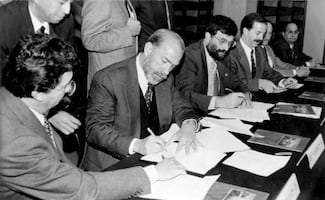Más Información

Morena en San Lázaro cierra filas con Claudia Sheinbaum por reforma electoral; Monreal reconoce que no hay acuerdo con aliados

Gurría Treviño, salario mensual equivalía al de dos presidentes de México; se jubiló a los 43 años con jugosa pensión

Familiares del matrimonio poblano asesinado exigen agotar todas las líneas de investigación; "no descansaremos hasta obtener verdad y justicia"

Cae jefe operativo del CJNG, junto a 13 presuntos secuestradores en Veracruz; liberan a una persona privada de su libertad

Investigan desaparición del hijo del exsenador Jorge Luis Preciado tras localizar su auto calcinado; revisan cámaras de la zona
The presentation of the National Development Plan ( NDP ) last week by the president of Mexico , Andrés Manuel López Obrador , has put on the table again the issue of drug decriminalization , while the country struggles to contain the growing violence of organized crime .
According to the NDP, as López Obrador promised during his electoral campaign in 2018, the Mexican federal government has undertook a “ paradigm change ” in national and public security, due to the “unsustainable” and “catastrophic results” of the prohibitionist strategy that left more than 250,000 murders since the start of the so-called “ war on drugs ” in 2006.
“The only real possibility of reducing the levels of drug consumption resides in lifting the prohibition of [ those ] that are currently illegal and in the redirection of the resources dedicated to combatting drug trafficking, in order to apply them in—massive yet personalized— rehabilitation and detoxification programs ," the document states.
In the first three months of López Obrador’s administration, drug-related violence has soared in Mexico, with 8,524 murders, an increase of 12% compared to the same period of the previous two years between December 2017 and February 2018, when 7,565 homicides were registered by the National System of Public Security .
However, the NDP does not specify which drugs would be decriminalized, although current Interior Minister Olga Sánchez Cordero introduced as a Senator a law proposal for the regulation of marijuana in November.
The legislation allows recreational, commercial, scientific and research use of cannabis and its derivatives
. It would allow Mexican citizens to plant, grow, harvest, make use, prepare, and transform a maximum of 20 marijuana plants for personal consumption as it does not exceed 480 grams per year .
Following the example of the United States and several European countries , public and governmental attitudes towards marijuana use have changed in recent years.
Seven years ago, the presidents of Mexico , Colombia , and Guatemala called the United Nations General Assembly to organize a special session devoted to drug reform in 2016 . The corresponding omnibus resolution was sponsored by Mexico and co-sponsored by 95 members of the international body.
Speaking before the UNGASS 2016 , then-President Enrique Peña Nieto said that Mexico’s new approach to narcotics was based on human rights and public health , avoiding the criminalization of consumers.
Marijuana charges
One month later, Peña Nieto sent Congress a bill to legalize medicine that contains cannabis , allow people to carry 28 grams of marijuana, and free some prisoners convicted on marijuana charges .
For its part, Mexico’s Supreme Court ruled that the government had no constitutional right to arrest people for their “ civil right ” of growing marijuana .
Economic factors
also played a significant role. By 2016 , four U.S. states and the District of Columbia had legalized medical and recreational cannabis , and 20 more states authorized its use as medicine .
The legalized market grew from USD $6 billion to USD $52 billion this year and the industry estimates that the economic impact could reach as high as USD $77 billion by 2022 , employing nearly half a million U.S. citizens.
Even in the absence of legislation in force, former Mexican President Vicente Fox is an advocate for cannabis legalization , sitting on the boards of directors of marijuana-culture magazine High Times and Khiron Life Sciences Corp . a Canadian-headquartered marijuana company that is focusing on Latin American markets .
Things are very different regarding hard drugs . Displaced from the U.S. market by legal, sophisticated local producers who grow more potent strains of cannabis in hydroponic greenhouses , wild marijuana Mexican producers resorted to the traditional poppy gum mixed with chemicals to make heroin .
Now the Sinaloa Cartel and other major drug-trafficking organizations are in the business of fentanyl , a synthetic opioid 50 times more potent than heroin responsible, along with prescription drugs such as oxycodone , for the U.S. “ opioid epidemic .”
Last year, Senator Alfonso Durazo Montaño , now Security and Citizen Protection Minister , confirmed Sánchez Cordero’s plan to offer amnesty to the people who produced drugs for the cartels , as well as those who were employed as transport “ mules ” and as vigilantes .
A former judge of the Supreme Court, Sánchez Cordero said tha t poppy production would be legalized in order to supply the pharmaceutical industry since Mexico imports all the opiates it requires for medical use.
Nevertheless, this is not mentioned in the NDP and Mexico would need the approval of the International Narcotics Control Board , the independent control organ for the implementation of the U.N. drug conventions .
Given the White House’s prohibitionist approach to marijuana and its tirades against the Mexican cartels , the proposal is not likely to ever materialize.
López Obrador rejected this week the bilateral anti-drug cooperation agreement known as Mérida Initiative , stressing that its funding should go to development programs and job creation in southern Mexico, as well as in Central America.
A cornerstone of the “ war on drugs , ” the USD $3 billion Mérida Initiative was negotiated by the Bush and Calderón administrations in 2008.
For the first time, a historically reluctant Mexican Army strengthened its cooperation with the U.S. Armed Forces ; funding also helped to train Mexican police forces and supported justice programs.
The U.S. Congress approved funding of USD $145 million in fiscal 2019 under the agreement, aimed at stopping heroin and fentanyl reaching the United States.
A March 11 report from the U.S. Congressional Research Service highlighted that “critics of the Mérida Initiative have focused on continued violence, the government’s poor human rights record, and prosecutors’ inability to secure convictions. Homicides in Mexico are at record levels.”
It added that some observers maintain that López Obrador has accommodated the Trump administration’s “emphasis on combating Central American migration and may back other U.S. priorities, despite the domestic criticism he may receive.”
Editing by Sofía Danis
More by Gabriel Moyssen
Noticias según tus intereses
[Publicidad]
[Publicidad]











